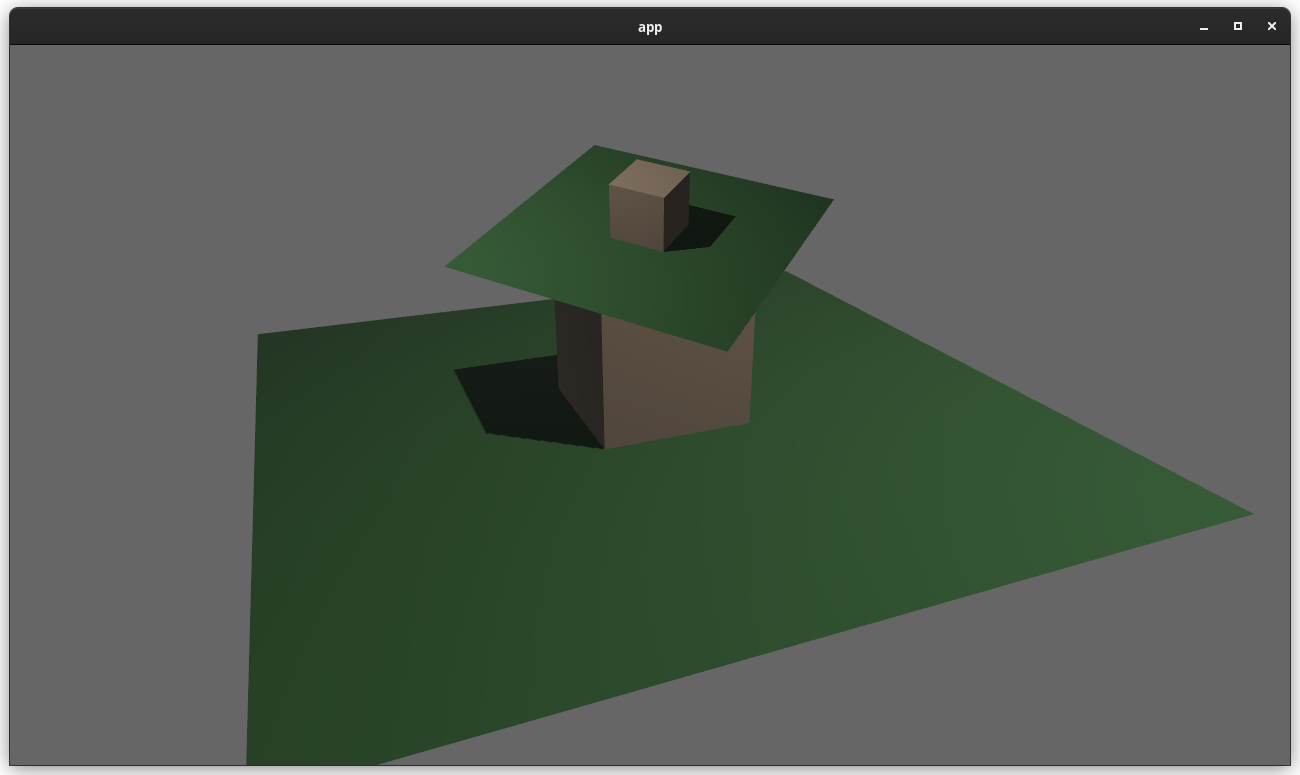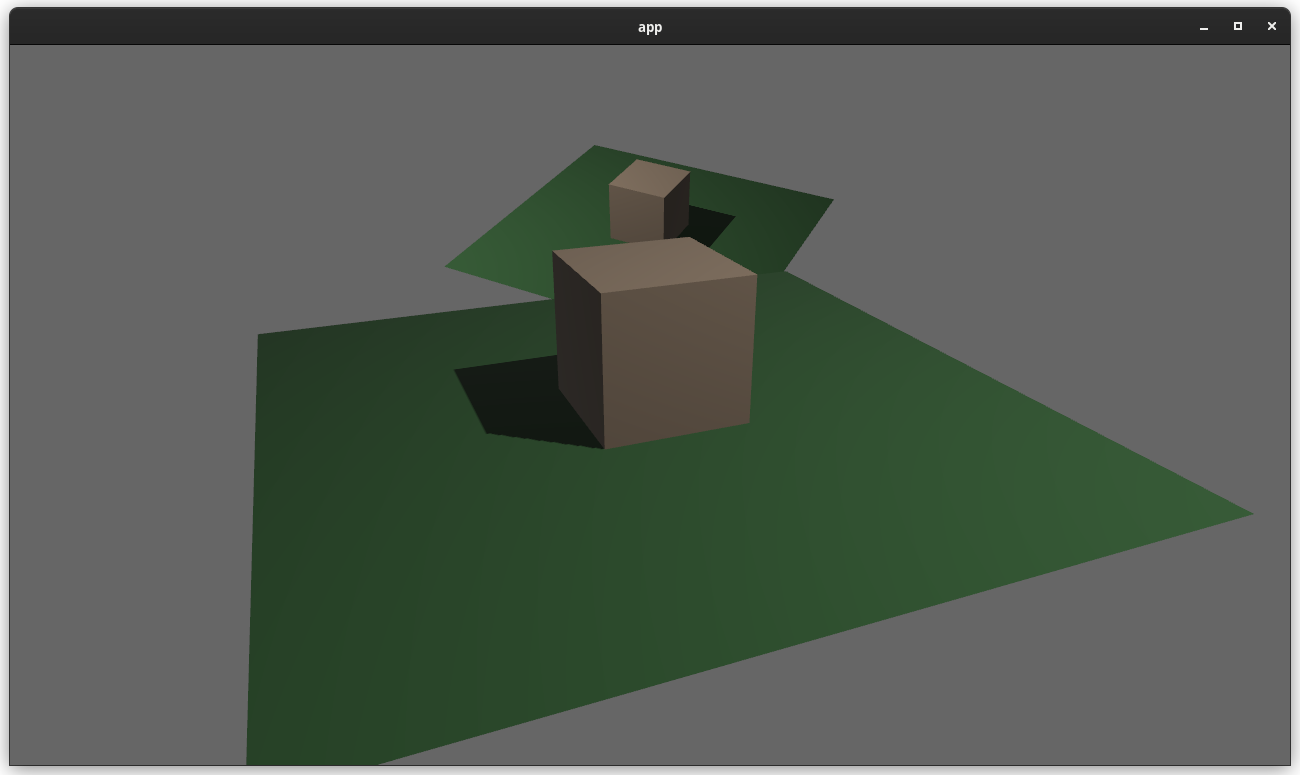mirror of
https://github.com/bevyengine/bevy
synced 2025-02-18 15:08:36 +00:00
# Objective
Users should be able to configure depth load operations on cameras. Currently every camera clears depth when it is rendered. But sometimes later passes need to rely on depth from previous passes.
## Solution
This adds the `Camera3d::depth_load_op` field with a new `Camera3dDepthLoadOp` value. This is a custom type because Camera3d uses "reverse-z depth" and this helps us record and document that in a discoverable way. It also gives us more control over reflection + other trait impls, whereas `LoadOp` is owned by the `wgpu` crate.
```rust
commands.spawn_bundle(Camera3dBundle {
camera_3d: Camera3d {
depth_load_op: Camera3dDepthLoadOp::Load,
..default()
},
..default()
});
```
### two_passes example with the "second pass" camera configured to the default (clear depth to 0.0)

### two_passes example with the "second pass" camera configured to "load" the depth

---
## Changelog
### Added
* `Camera3d` now has a `depth_load_op` field, which can configure the Camera's main 3d pass depth loading behavior.
159 lines
5 KiB
Rust
159 lines
5 KiB
Rust
//! Shows how to render to a texture. Useful for mirrors, UI, or exporting images.
|
|
|
|
use bevy::{
|
|
core_pipeline::clear_color::ClearColorConfig,
|
|
prelude::*,
|
|
render::{
|
|
camera::RenderTarget,
|
|
render_resource::{
|
|
Extent3d, TextureDescriptor, TextureDimension, TextureFormat, TextureUsages,
|
|
},
|
|
view::RenderLayers,
|
|
},
|
|
};
|
|
|
|
fn main() {
|
|
App::new()
|
|
.add_plugins(DefaultPlugins)
|
|
.add_startup_system(setup)
|
|
.add_system(cube_rotator_system)
|
|
.add_system(rotator_system)
|
|
.run();
|
|
}
|
|
|
|
// Marks the first pass cube (rendered to a texture.)
|
|
#[derive(Component)]
|
|
struct FirstPassCube;
|
|
|
|
// Marks the main pass cube, to which the texture is applied.
|
|
#[derive(Component)]
|
|
struct MainPassCube;
|
|
|
|
fn setup(
|
|
mut commands: Commands,
|
|
mut meshes: ResMut<Assets<Mesh>>,
|
|
mut materials: ResMut<Assets<StandardMaterial>>,
|
|
mut images: ResMut<Assets<Image>>,
|
|
) {
|
|
let size = Extent3d {
|
|
width: 512,
|
|
height: 512,
|
|
..default()
|
|
};
|
|
|
|
// This is the texture that will be rendered to.
|
|
let mut image = Image {
|
|
texture_descriptor: TextureDescriptor {
|
|
label: None,
|
|
size,
|
|
dimension: TextureDimension::D2,
|
|
format: TextureFormat::Bgra8UnormSrgb,
|
|
mip_level_count: 1,
|
|
sample_count: 1,
|
|
usage: TextureUsages::TEXTURE_BINDING
|
|
| TextureUsages::COPY_DST
|
|
| TextureUsages::RENDER_ATTACHMENT,
|
|
},
|
|
..default()
|
|
};
|
|
|
|
// fill image.data with zeroes
|
|
image.resize(size);
|
|
|
|
let image_handle = images.add(image);
|
|
|
|
let cube_handle = meshes.add(Mesh::from(shape::Cube { size: 4.0 }));
|
|
let cube_material_handle = materials.add(StandardMaterial {
|
|
base_color: Color::rgb(0.8, 0.7, 0.6),
|
|
reflectance: 0.02,
|
|
unlit: false,
|
|
..default()
|
|
});
|
|
|
|
// This specifies the layer used for the first pass, which will be attached to the first pass camera and cube.
|
|
let first_pass_layer = RenderLayers::layer(1);
|
|
|
|
// The cube that will be rendered to the texture.
|
|
commands
|
|
.spawn_bundle(PbrBundle {
|
|
mesh: cube_handle,
|
|
material: cube_material_handle,
|
|
transform: Transform::from_translation(Vec3::new(0.0, 0.0, 1.0)),
|
|
..default()
|
|
})
|
|
.insert(FirstPassCube)
|
|
.insert(first_pass_layer);
|
|
|
|
// Light
|
|
// NOTE: Currently lights are shared between passes - see https://github.com/bevyengine/bevy/issues/3462
|
|
commands.spawn_bundle(PointLightBundle {
|
|
transform: Transform::from_translation(Vec3::new(0.0, 0.0, 10.0)),
|
|
..default()
|
|
});
|
|
|
|
commands
|
|
.spawn_bundle(Camera3dBundle {
|
|
camera_3d: Camera3d {
|
|
clear_color: ClearColorConfig::Custom(Color::WHITE),
|
|
..default()
|
|
},
|
|
camera: Camera {
|
|
// render before the "main pass" camera
|
|
priority: -1,
|
|
target: RenderTarget::Image(image_handle.clone()),
|
|
..default()
|
|
},
|
|
transform: Transform::from_translation(Vec3::new(0.0, 0.0, 15.0))
|
|
.looking_at(Vec3::default(), Vec3::Y),
|
|
..default()
|
|
})
|
|
.insert(first_pass_layer);
|
|
|
|
let cube_size = 4.0;
|
|
let cube_handle = meshes.add(Mesh::from(shape::Box::new(cube_size, cube_size, cube_size)));
|
|
|
|
// This material has the texture that has been rendered.
|
|
let material_handle = materials.add(StandardMaterial {
|
|
base_color_texture: Some(image_handle),
|
|
reflectance: 0.02,
|
|
unlit: false,
|
|
..default()
|
|
});
|
|
|
|
// Main pass cube, with material containing the rendered first pass texture.
|
|
commands
|
|
.spawn_bundle(PbrBundle {
|
|
mesh: cube_handle,
|
|
material: material_handle,
|
|
transform: Transform {
|
|
translation: Vec3::new(0.0, 0.0, 1.5),
|
|
rotation: Quat::from_rotation_x(-std::f32::consts::PI / 5.0),
|
|
..default()
|
|
},
|
|
..default()
|
|
})
|
|
.insert(MainPassCube);
|
|
|
|
// The main pass camera.
|
|
commands.spawn_bundle(Camera3dBundle {
|
|
transform: Transform::from_translation(Vec3::new(0.0, 0.0, 15.0))
|
|
.looking_at(Vec3::default(), Vec3::Y),
|
|
..default()
|
|
});
|
|
}
|
|
|
|
/// Rotates the inner cube (first pass)
|
|
fn rotator_system(time: Res<Time>, mut query: Query<&mut Transform, With<FirstPassCube>>) {
|
|
for mut transform in query.iter_mut() {
|
|
transform.rotation *= Quat::from_rotation_x(1.5 * time.delta_seconds());
|
|
transform.rotation *= Quat::from_rotation_z(1.3 * time.delta_seconds());
|
|
}
|
|
}
|
|
|
|
/// Rotates the outer cube (main pass)
|
|
fn cube_rotator_system(time: Res<Time>, mut query: Query<&mut Transform, With<MainPassCube>>) {
|
|
for mut transform in query.iter_mut() {
|
|
transform.rotation *= Quat::from_rotation_x(1.0 * time.delta_seconds());
|
|
transform.rotation *= Quat::from_rotation_y(0.7 * time.delta_seconds());
|
|
}
|
|
}
|